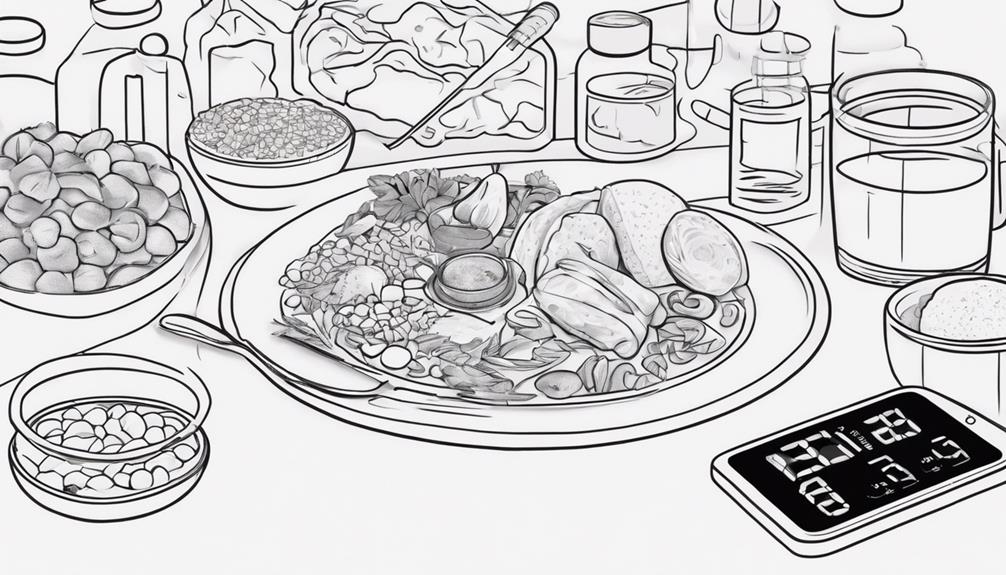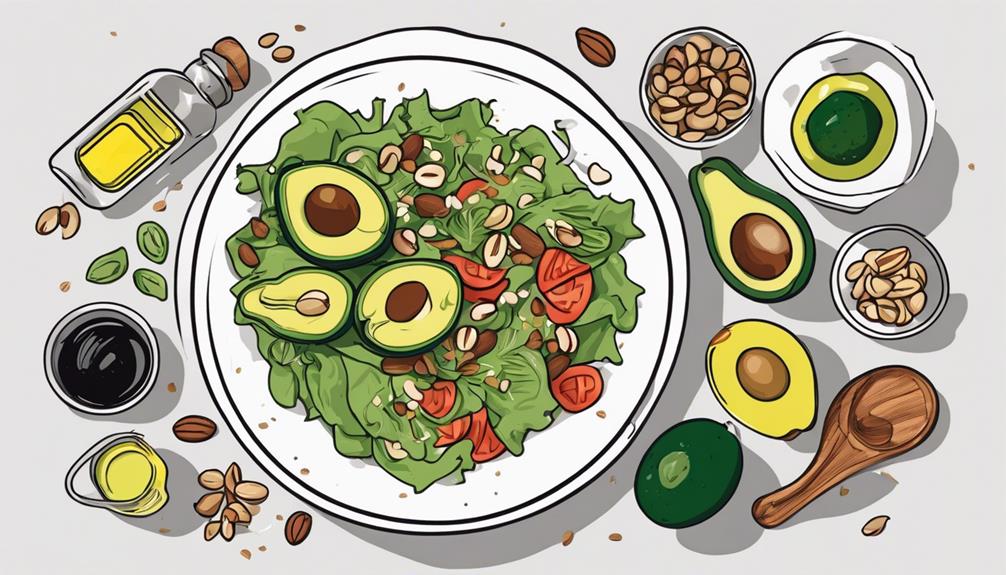Imagine your diet as a delicate puzzle, each piece vital to maintaining balance and harmony. Type 1 diabetes adds a layer of complexity, influencing not just what you eat but how you approach every meal. From meticulously counting carbohydrates to understanding the impact of glycemic index, your food choices become a key player in managing your condition.
But what are the other four essential ways diabetes shapes your diet?
Key Takeaways
- Counting carbohydrates is crucial for insulin dosing.
- Consistent meal timing aids in blood sugar regulation.
- Choosing low glycemic index foods prevents spikes.
- Portion control and mindful eating optimize blood sugar levels.
Carbohydrate Counting for Insulin Management

When managing your insulin levels with type 1 diabetes, counting carbohydrates accurately is crucial for maintaining stable blood sugar levels throughout the day. Insulin dosing is directly correlated with the amount of carbohydrates you consume, making meal planning an essential aspect of diabetes management. To effectively control your blood sugar, it's imperative to understand the carbohydrate content of foods and how they impact your insulin requirements.
Accurate carbohydrate counting allows you to adjust your insulin dosing to match the carbohydrates you eat, helping you avoid sudden spikes or drops in blood sugar levels. This meticulous approach to meal planning empowers you to maintain better control over your diabetes and overall well-being. By consistently monitoring your carbohydrate intake and aligning it with your insulin doses, you can optimize your blood sugar levels and reduce the risk of complications associated with type 1 diabetes.
Balancing Blood Sugar Levels With Meals
To maintain stable blood sugar levels throughout the day with type 1 diabetes, it's crucial to understand how different foods impact your body's insulin requirements, especially when balancing blood sugar levels with meals.
When it comes to balancing blood sugar levels with meals, consider the following:
- Meal Timing: Plan your meals at consistent times each day to help regulate blood sugar levels effectively. Irregular meal times can lead to fluctuations in blood sugar, making it harder to manage your condition.
- Protein Sources: Incorporating lean protein sources like chicken, fish, tofu, or legumes into your meals can help balance blood sugar levels. Proteins digest more slowly than carbohydrates, providing a steady release of glucose into the bloodstream.
- Balance: Strive for a balanced plate with a mix of carbohydrates, proteins, and healthy fats. This balance can prevent sudden spikes or drops in blood sugar levels, promoting better overall control of your diabetes.
Impact of Glycemic Index on Food Choices

Understanding the impact of glycemic index on food choices is essential for individuals with type 1 diabetes to effectively manage their blood sugar levels. The glycemic index ranks foods based on how quickly they raise blood sugar levels. Choosing foods with a low glycemic index can help prevent sudden spikes in blood glucose levels.
When planning your meals, opt for whole grains like quinoa or barley instead of refined grains like white bread. Incorporating legumes such as lentils and chickpeas can also help maintain stable blood sugar levels due to their lower glycemic index. Additionally, including high-fiber foods like fruits, vegetables, and nuts in your diet can slow down the absorption of sugars, further aiding in blood sugar control.
Be cautious with sugar substitutes as some can still impact blood sugar levels. It's crucial to monitor your fiber intake as it can affect how your body processes carbohydrates and influences blood sugar levels.
Monitoring Portion Sizes for Diabetes Control
Monitoring portion sizes is crucial for effectively managing blood sugar levels in individuals with type 1 diabetes. When it comes to controlling your portions, here are three key points to keep in mind:
- Mindful Eating: Engage in mindful eating practices by paying attention to your body's hunger and fullness cues. Avoid distractions while eating, such as watching TV or using your phone, as this can lead to overeating.
- Portion Control: Use measuring cups, food scales, or visual cues to ensure you're consuming appropriate portion sizes. This can help prevent spikes in blood sugar levels and keep your diabetes in check.
- Balanced Meals: Aim for a well-balanced plate with a mix of carbohydrates, proteins, and fats. This can help regulate blood sugar levels more effectively than consuming large portions of any single food group.
Incorporating Healthy Fats Into Your Diet

Incorporate healthy fats into your diet gradually to optimize your overall nutritional intake and support your type 1 diabetes management effectively. Omega 3 benefits are crucial for heart health and can help reduce inflammation, which is beneficial for individuals with type 1 diabetes. Include sources of omega-3 fatty acids such as fatty fish (salmon, mackerel, sardines), chia seeds, flaxseeds, and walnuts in your diet. These foods can also aid in controlling blood sugar levels and reducing the risk of cardiovascular complications associated with diabetes.
When choosing fats, consider plant-based options like avocados, olive oil, and nuts. Avocados are rich in monounsaturated fats that promote good cholesterol levels and can enhance insulin sensitivity. Olive oil is a healthy fat that's a staple of the Mediterranean diet, known for its numerous health benefits. Nuts, such as almonds and cashews, provide a mix of healthy fats, protein, and fiber, making them a great snack choice for individuals with type 1 diabetes. By incorporating these healthy fats into your diet, you can improve your overall health and better manage your diabetes.
Frequently Asked Questions
Can Different Types of Physical Activity Have an Impact on Blood Sugar Levels for Individuals With Type 1 Diabetes?
Different types of physical activity can impact blood sugar levels for individuals with type 1 diabetes. Yoga benefits include improved blood sugar control, while weight training can help regulate glucose levels by increasing insulin sensitivity and enhancing overall metabolic health.
How Does Stress Affect Insulin Management and Blood Sugar Control in Individuals With Type 1 Diabetes?
When stress increases, it can impact insulin management, affecting blood sugar control. Stress triggers the release of hormones like cortisol, which can lead to higher blood sugar levels. Managing stress effectively is crucial for stable blood sugar.
Are There Specific Vitamins and Minerals That Individuals With Type 1 Diabetes Should Pay Special Attention to in Their Diet?
To ensure optimal nutrient absorption and maintain dietary balance, individuals with type 1 diabetes should focus on meal timing and nutrient timing. Pay special attention to vitamins like C and D, as well as minerals such as magnesium and zinc.
How Does Sleep Quality and Quantity Play a Role in Managing Blood Sugar Levels for Those With Type 1 Diabetes?
You know, getting enough shut-eye and having good sleep habits can really help keep your blood sugar in check. It's like a secret weapon in managing your diabetes alongside meal timing, exercise, hydration, and carb intake.
Are There Any Specific Herbs or Supplements That Can Help With Insulin Sensitivity and Blood Sugar Control in Individuals With Type 1 Diabetes?
When managing Type 1 diabetes, herbal remedies and supplements can aid in improving insulin sensitivity. Incorporating these into your diet can enhance blood sugar control. Discuss with your healthcare provider for guidance on the most suitable options for you.
Conclusion
In conclusion, managing type 1 diabetes involves:
- Carefully monitoring carbohydrate intake
- Balancing blood sugar levels with meals
- Considering the glycemic index of foods
- Controlling portion sizes
- Incorporating healthy fats into your diet
These dietary adjustments are essential for maintaining stable blood sugar levels and overall health.
By making informed choices and being mindful of your diet, you can effectively manage your diabetes and lead a healthy lifestyle.